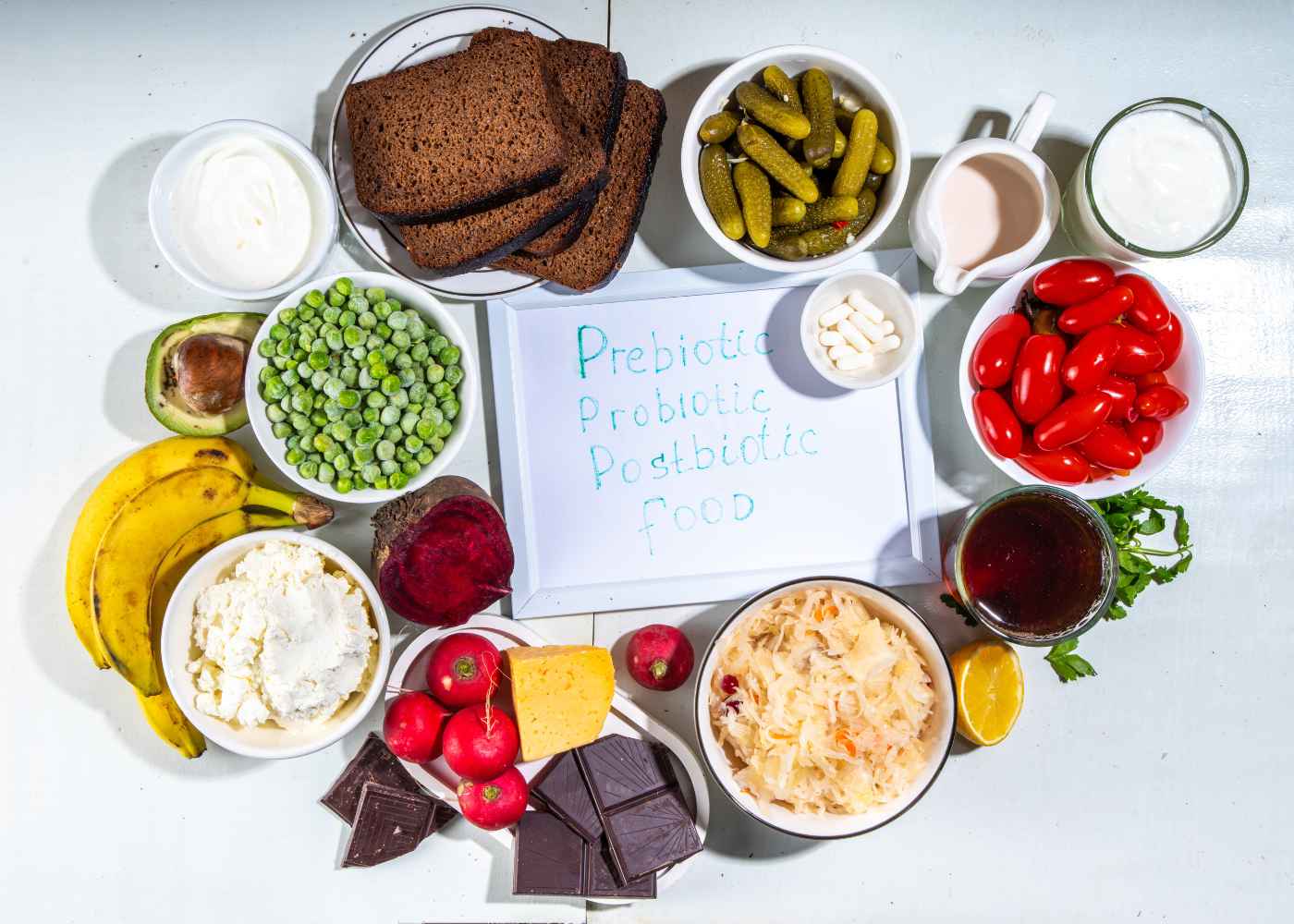
Probiotics and prebiotics are both important for digestive health. Probiotics are live microorganisms that help to maintain the balance of beneficial bacteria in the gut. Prebiotics, on the other hand, are indigestible plant fibers that feed and stimulate the growth of probiotic bacteria in the large intestine. Both probiotics and prebiotics can have a variety of benefits for digestive health, including reducing symptoms associated with irritable bowel syndrome (IBS), improving intestinal health, and enhancing immunity.

Probiotics and Gut Bacteria
Probiotics are live microorganisms, usually bacteria, that
can provide health benefits when consumed. They work by restoring balance to
the natural microbial environment in the gut and help maintain healthy
digestion. Probiotics are thought to play a role in regulating metabolism,
improving intestinal health, and boosting immunity. Many people use probiotic
supplements or foods that contain them as part of their daily diet for these
benefits.
The human gastrointestinal (GI) tract contains hundreds of
different species of bacteria which make up what is known as our œgut
microbiome or œmicrobiome for short. These microscopic creatures work
together with other organisms like yeasts and fungi to create an environment
that helps us break down food into energy and nutrients so they can be absorbed
into the bloodstream. The microbiome also plays a critical role in protecting
our bodies from disease-causing pathogens while aiding digestion and helping us
absorb vitamins from the foods we eat.
Gut bacteria help keep harmful substances out of our body, stimulate the immune system, produce vitamins such as K2 which is important for strong bones, aid nutrient absorption in general including B12 absorption which is essential for energy levels, regulate hormones like serotonin - often referred to as 'the happiness hormone', reduce inflammation throughout the body including digestive issues such as IBS (irritable bowel syndrome), protect against certain allergies & asthma symptoms plus much more! It's clear how important it is then to ensure we have enough beneficial gut bacteria present at all times within our GI tract; this makes consuming probiotics on a regular basis even more important!

Prebiotics and Fibre
Prebiotics are non-digestible carbohydrates that stimulate
the growth of beneficial bacteria in the intestines. They serve as food for
probiotics, providing them with energy and nutrients to thrive. Prebiotics can
be found naturally in certain foods such as artichokes, onions, bananas,
garlic, leeks and oats.
Fibre is an important nutrient that helps keep our digestive
system healthy by removing toxins from the body, helping maintain regular bowel
movements and relieving constipation or diarrhoea. It also plays a role in
reducing cholesterol levels and stabilizing blood sugar levels. Good sources of
fibre include whole grains like brown rice or quinoa; fruits such as apples and
oranges; vegetables including broccoli, Brussels sprouts and spinach; legumes
like lentils or beans; nuts like almonds or walnuts; seeds such as chia or
flaxseed; plus potatoes with their skin on! Eating a diet rich in these foods
will provide your body with plenty of fibre to help support digestion and health.
In conclusion, prebiotics is essential for promoting gut health by providing nutrition for probiotic bacteria while dietary fiber is key to supporting overall digestive well-being. Consuming a variety of prebiotic-rich foods alongside high-fiber choices regularly will ensure your digestive system stays healthy and functions optimally!

Uses and Benefits for Digestive Health
The use of probiotics and prebiotics can be beneficial for
reducing symptoms associated with irritable bowel syndrome (IBS). IBS is a
common digestive disorder that affects the large intestine, causing abdominal
pain, cramping, bloating, gas and changes in bowel movements. Studies have
shown that certain strains of probiotic bacteria may help to reduce symptoms by
balancing microbial diversity in the gut. Prebiotics are also thought to play an
important role in improving intestinal health by stimulating the growth of
probiotic bacteria which helps maintain a healthy balance throughout the
digestive system.
Consuming foods or supplements rich in both
pre-and-probiotics can help enhance immunity as well. The ˜good™ bacteria in these products act as a barrier against harmful pathogens and support our body's natural defence against illnesses like colds or flu. Probiotic
supplementation has also been linked to improved immune responses to vaccinations;
this means it could potentially increase protection from infectious diseases
such as measles or mumps!
In addition, consuming prebiotic-rich foods can aid digestion by increasing levels of beneficial microorganisms like bifidobacteria which are responsible for breaking down dietary fiber into energy sources your body can absorb more easily. This process not only provides us with essential nutrients but also prevents constipation and other gastrointestinal issues caused by slow digestion!

Risks and Usage Guidance
Probiotics and prebiotics have generally been found to be
safe for most people. However, it is important to note that they can cause side
effects in some individuals. These include abdominal cramping or discomfort,
bloating, gas, nausea and diarrhoea. It is also possible for the probiotic
bacteria to colonize the GI tract leading to an overgrowth of harmful
microorganisms and an increased risk of infection.
In rare cases, taking probiotics has been linked with
serious complications such as sepsis (a life-threatening blood infection) in
people with weakened immune systems or those already suffering from severe
illness. Therefore it™s always best to discuss any use of supplements
containing probiotics with your healthcare provider before starting them in
order to ensure their safety and effectiveness for your particular condition or
needs!
When choosing a supplement containing both pre-and-probiotic
ingredients it's important to read labels carefully; look out for products free
from artificial colours or flavours as well as preservatives which could
potentially irritate sensitive stomachs! Additionally, check if there are
allergens present such as lactose - this could be especially useful if you™re
avoiding dairy products due to allergies etc.. An ideal product should contain
only natural ingredients known not just safe but beneficial too!
Finally when taking these supplements make sure you stick closely to the dosage recommendation on the label; sometimes more isn't necessarily better so don't exceed what's advised unless instructed by a doctor/nutritionist first! And lastly, even though these are considered ˜supplements™ rather than medicine they still require proper storage conditions like keeping them away from heat & moisture sources so ensure check package instructions before storing them at home too!

Conclusion
Probiotics and prebiotics offer a range of potential health
benefits backed by scientific research. Consuming these
beneficial bacteria can help to maintain a balanced gut microbiome and support
digestion, nutrient absorption, immune system regulation, and hormone balance
as well as reduce inflammation. Prebiotic-rich foods such as onions or bananas
also provide essential energy sources for probiotic bacteria to thrive on while
dietary fibre is key in helping the body rid itself of toxins plus aiding
regularity. To ensure maximum benefit from taking them it™s important to follow
recommended dosages and be aware of any allergies or sensitivities you may have
when selecting supplements containing both pre-and-probiotics - always check
product labels carefully! Finally, ensure they are stored correctly so their
potency is preserved; this could involve keeping them away from heat &
moisture sources according to package instructions! By following these
guidelines you can enjoy the many positive effects that probiotics and
prebiotics can bring!




















